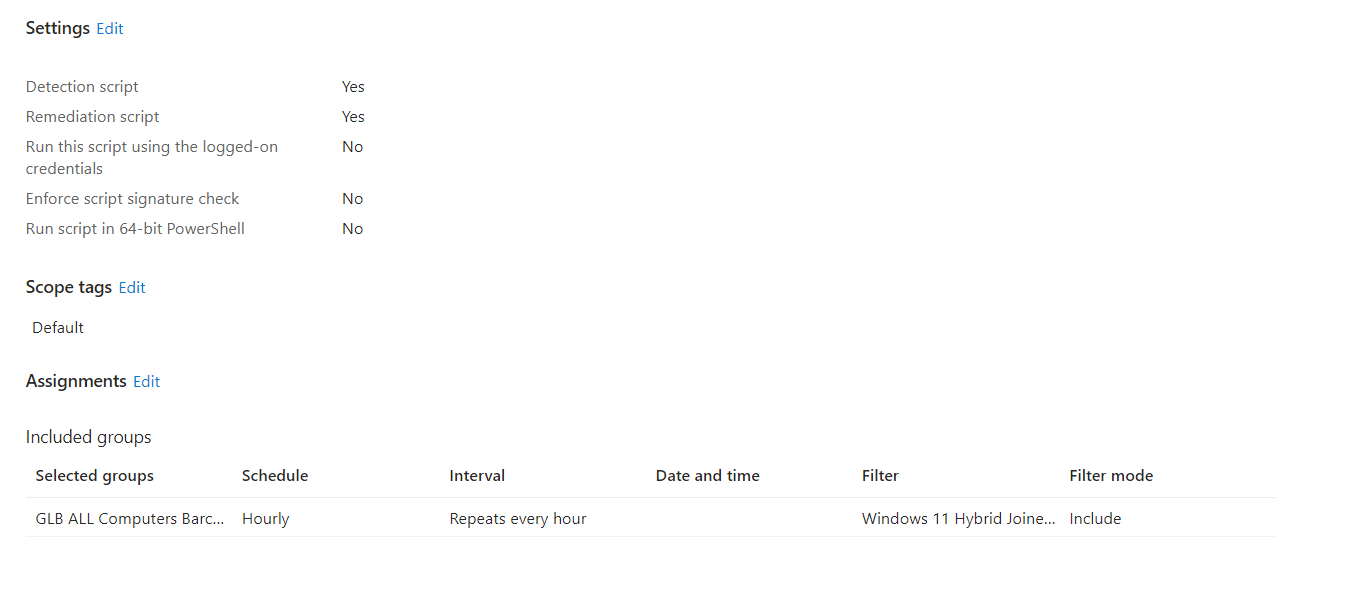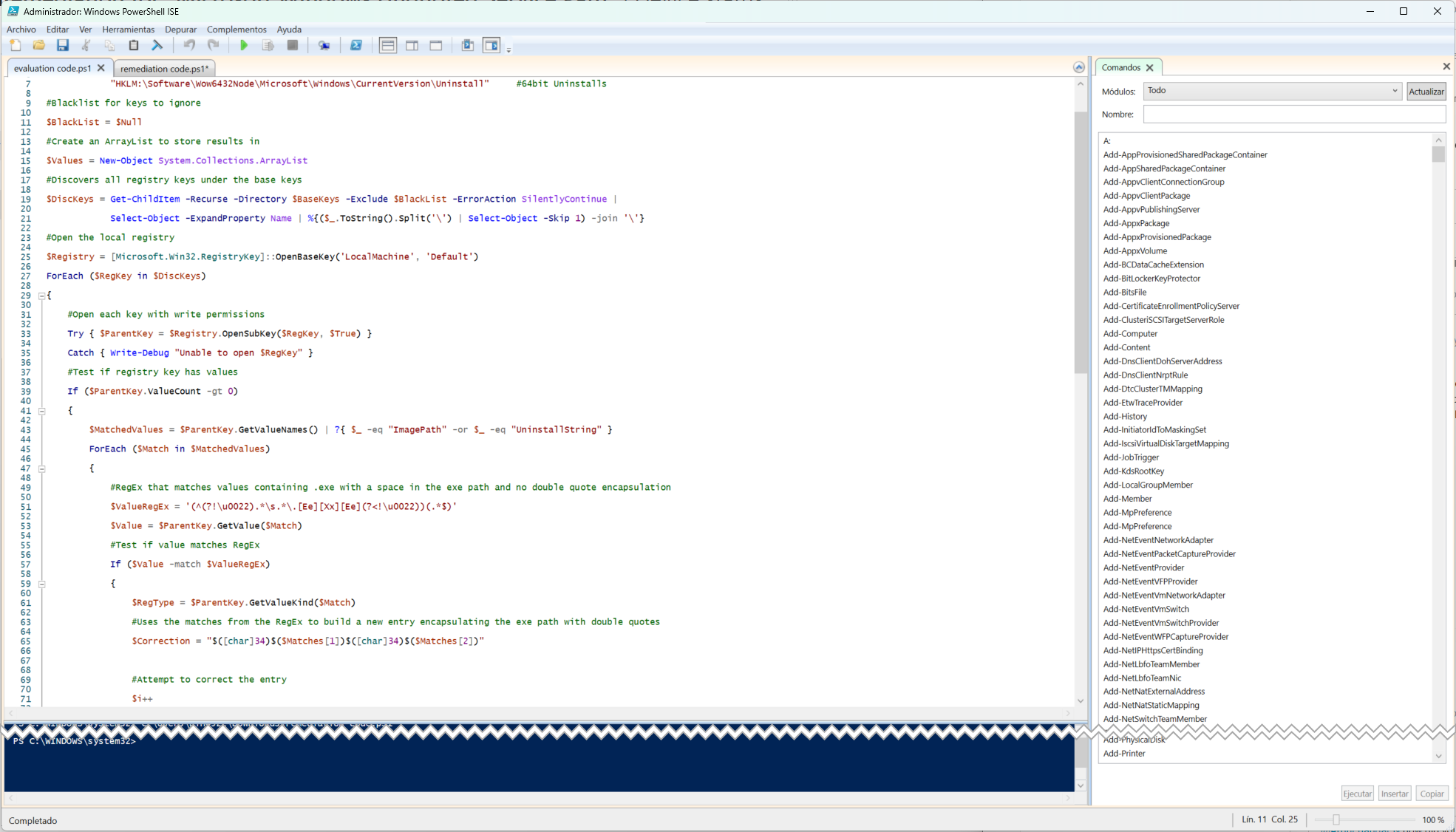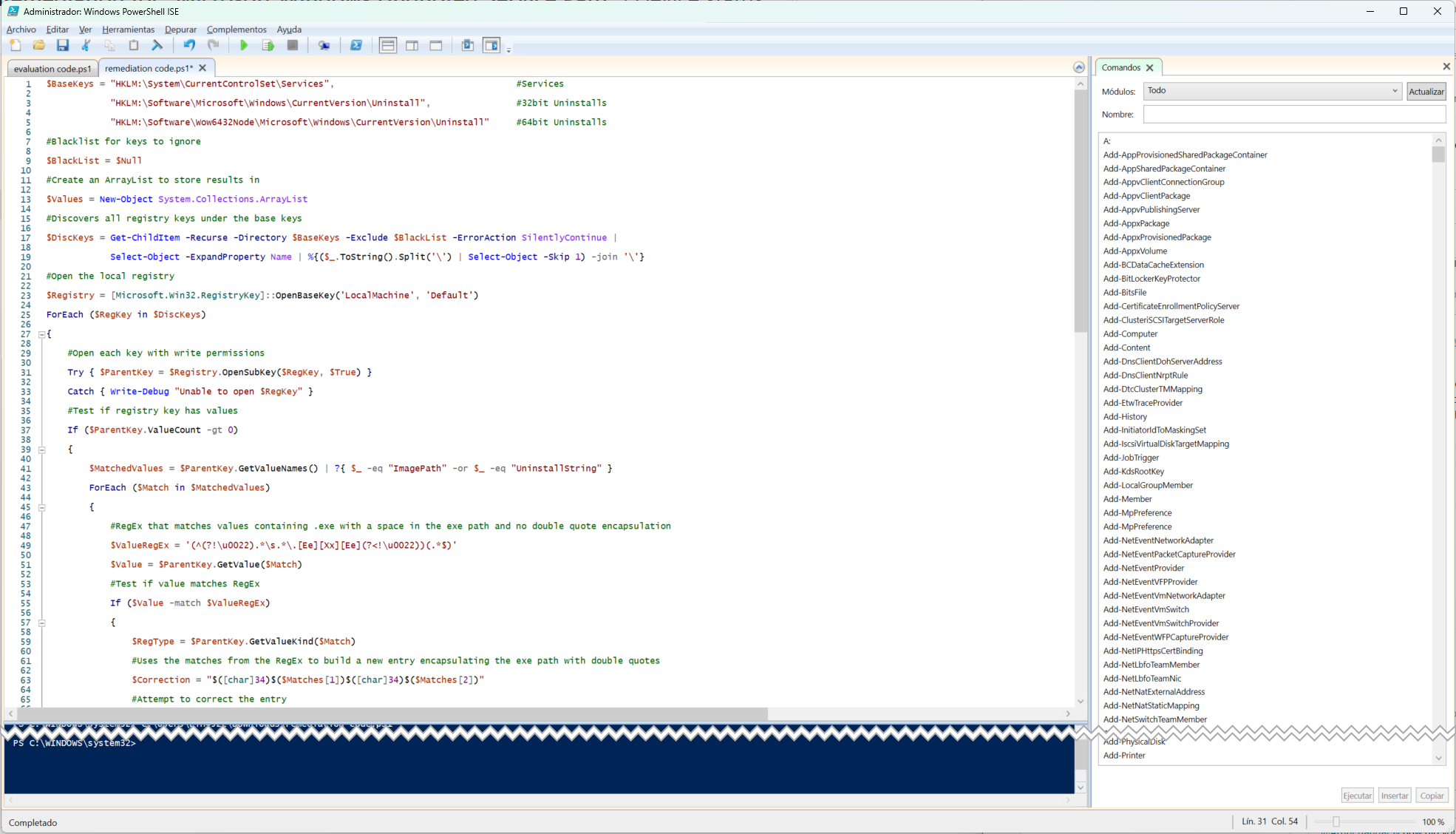This worklet will search for Windows Unquoted Search Path under uninstall and services in registry and add quotes. This addresses a vulnerability detected by some tools like Rapid7 or Nessus. All changes made by the script are logged under C:\windows\temp\unquoted-search-path-changes.csv.
#Evaluation Code
$i = 0
$BaseKeys = "HKLM:\System\CurrentControlSet\Services", #Services
"HKLM:\Software\Microsoft\Windows\CurrentVersion\Uninstall", #32bit Uninstalls
"HKLM:\Software\Wow6432Node\Microsoft\Windows\CurrentVersion\Uninstall" #64bit Uninstalls
#Blacklist for keys to ignore
$BlackList = $Null
#Create an ArrayList to store results in
$Values = New-Object System.Collections.ArrayList
#Discovers all registry keys under the base keys
$DiscKeys = Get-ChildItem -Recurse -Directory $BaseKeys -Exclude $BlackList -ErrorAction SilentlyContinue |
Select-Object -ExpandProperty Name | %{($_.ToString().Split('\') | Select-Object -Skip 1) -join '\'}
#Open the local registry
$Registry = [Microsoft.Win32.RegistryKey]::OpenBaseKey('LocalMachine', 'Default')
ForEach ($RegKey in $DiscKeys)
{
#Open each key with write permissions
Try { $ParentKey = $Registry.OpenSubKey($RegKey, $True) }
Catch { Write-Debug "Unable to open $RegKey" }
#Test if registry key has values
If ($ParentKey.ValueCount -gt 0)
{
$MatchedValues = $ParentKey.GetValueNames() | ?{ $_ -eq "ImagePath" -or $_ -eq "UninstallString" }
ForEach ($Match in $MatchedValues)
{
#RegEx that matches values containing .exe with a space in the exe path and no double quote encapsulation
$ValueRegEx = '(^(?!\u0022).*\s.*\.[Ee][Xx][Ee](?<!\u0022))(.*$)'
$Value = $ParentKey.GetValue($Match)
#Test if value matches RegEx
If ($Value -match $ValueRegEx)
{
$RegType = $ParentKey.GetValueKind($Match)
#Uses the matches from the RegEx to build a new entry encapsulating the exe path with double quotes
$Correction = "$([char]34)$($Matches[1])$([char]34)$($Matches[2])"
#Attempt to correct the entry
$i++
}
}
}
$ParentKey.Close()
}
$Registry.Close()
IF($i -eq 0){ Exit 0 }else{ Exit 1 }
#Remediation Code
$BaseKeys = "HKLM:\System\CurrentControlSet\Services", #Services
"HKLM:\Software\Microsoft\Windows\CurrentVersion\Uninstall", #32bit Uninstalls
"HKLM:\Software\Wow6432Node\Microsoft\Windows\CurrentVersion\Uninstall" #64bit Uninstalls
#Blacklist for keys to ignore
$BlackList = $Null
#Create an ArrayList to store results in
$Values = New-Object System.Collections.ArrayList
#Discovers all registry keys under the base keys
$DiscKeys = Get-ChildItem -Recurse -Directory $BaseKeys -Exclude $BlackList -ErrorAction SilentlyContinue |
Select-Object -ExpandProperty Name | %{($_.ToString().Split('\') | Select-Object -Skip 1) -join '\'}
#Open the local registry
$Registry = [Microsoft.Win32.RegistryKey]::OpenBaseKey('LocalMachine', 'Default')
ForEach ($RegKey in $DiscKeys)
{
#Open each key with write permissions
Try { $ParentKey = $Registry.OpenSubKey($RegKey, $True) }
Catch { Write-Debug "Unable to open $RegKey" }
#Test if registry key has values
If ($ParentKey.ValueCount -gt 0)
{
$MatchedValues = $ParentKey.GetValueNames() | ?{ $_ -eq "ImagePath" -or $_ -eq "UninstallString" }
ForEach ($Match in $MatchedValues)
{
#RegEx that matches values containing .exe with a space in the exe path and no double quote encapsulation
$ValueRegEx = '(^(?!\u0022).*\s.*\.[Ee][Xx][Ee](?<!\u0022))(.*$)'
$Value = $ParentKey.GetValue($Match)
#Test if value matches RegEx
If ($Value -match $ValueRegEx)
{
$RegType = $ParentKey.GetValueKind($Match)
#Uses the matches from the RegEx to build a new entry encapsulating the exe path with double quotes
$Correction = "$([char]34)$($Matches[1])$([char]34)$($Matches[2])"
#Attempt to correct the entry
Try { $ParentKey.SetValue("$Match", "$Correction", [Microsoft.Win32.RegistryValueKind]::$RegType) }
Catch { Write-Debug "Unable to write to $ParentKey" }
#Add a hashtable containing details of corrected key to ArrayList
$Values.Add((New-Object PSObject -Property @{
"Name" = $Match
"Type" = $RegType
"Value" = $Value
"Correction" = $Correction
"ParentKey" = "HKEY_LOCAL_MACHINE\$RegKey"
})) | Out-Null
}
}
}
$ParentKey.Close()
}
$Registry.Close()
$Values | Select-Object @{l='Timestamp';e={"$((Get-Date).ToShortDateString()) $((Get-Date).ToShortTimeString())"}},ParentKey,Value,Correction,Name,Type | export-csv C:\windows\temp\unquoted-search-path-changes.csv -NoTypeInformation -Append




